The Mediterranean diet, renowned for its abundant use of vegetables, fruits, whole grains, and healthy fats, has been adapted to suit those with celiac disease or gluten sensitivity through the incorporation of gluten-free alternatives. Non-Mediterranean spices and herbs play a crucial role in this adaptation, as they add not only vibrant flavors but also health benefits without introducing gluten into the diet. However, it’s important to ensure these seasonings are indeed gluten-free, as cross-contamination during processing can pose risks for those with celiac disease.
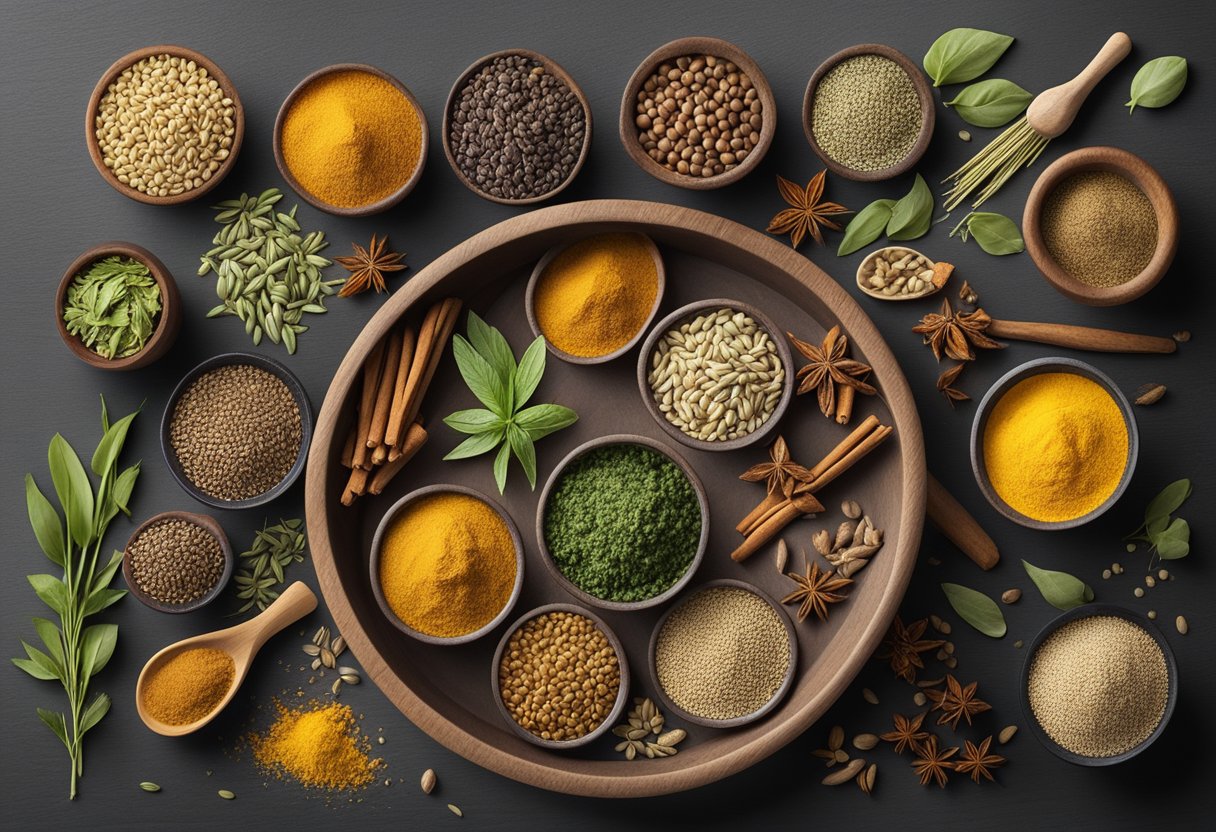
Though often assumed to be naturally gluten-free, some spices and herbs may come into contact with gluten-containing substances during their journey from farm to table. This makes it essential for individuals on a gluten-free Mediterranean diet to select seasonings that are certified or labeled gluten-free. Even among blends that traditionally do not contain gluten, like taco seasoning, one must exercise caution, opting for brands that guarantee a gluten-free product to avoid inadvertent gluten exposure.
Key Takeaways
- Seasonings enhance the flavor and health benefits of a gluten-free Mediterranean diet.
- Cross-contamination risks can be mitigated by choosing certified gluten-free spices and herbs.
- Careful selection of seasoning ensures compliance with a gluten-free diet without compromising taste.
Table of Contents
Foundations of the Gluten-Free Mediterranean Diet

The Gluten-Free Mediterranean Diet merges the rich flavors and nutritional benefits of the Mediterranean lifestyle with the dietary needs of individuals with gluten sensitivities.
Core Components and Health Benefits
The Gluten-Free Mediterranean Diet is characterized by a high intake of vegetables, fruits, and healthy fats such as olive oil. It is abundant in legumes, nuts, seeds, and whole grains that are naturally gluten-free. This diet is recognized for its health benefits, which include improved heart health and a lower risk of chronic diseases, due to its focus on whole foods and fiber-rich ingredients.
- Vegetables and Fruits: Provide essential vitamins, minerals, and antioxidants.
- Healthy Fats: Olive oil is a staple for cooking and dressings.
- Fish: Recommended for omega-3 fatty acids.
- Legumes, Nuts, and Seeds: Important sources of protein and nutrients.
Distinction Between Gluten-Free and Traditional Mediterranean Diet
The traditional Mediterranean Diet includes foods like couscous and bulgur, which contain gluten. Alternatively, the gluten-free version emphasizes gluten-free whole grains such as quinoa and rice. Herbs and spices used must be verified to be gluten-free to prevent cross-contamination. The inclusion of gluten-free herbs and spices ensures that flavors are enjoyed without compromising the dietary restrictions.
- Whole Grains: Choose gluten-free options such as buckwheat or millet.
- Herbs and Spices: Ensure they are pure and not mixed with gluten-containing fillers.
Incorporating Non-Mediterranean Spices and Herbs

While a gluten-free Mediterranean diet typically emphasizes regional herbs and spices, integrating non-Mediterranean varieties can enhance both flavor and health benefits. The area of focus includes the addition of global spices and herbs that align with the diet’s principles of healthy fats and antioxidants.
Spices and Herbs Compatible with a Gluten-Free Diet
- Turmeric: Rich in antioxidants and anti-inflammatory properties, it integrates seamlessly with the Mediterranean preference for health-promoting additives.
- Ginger: Often used for digestive health, brings a versatile flavor profile that can brighten up a variety of dishes without the worry of gluten contamination.
Incorporating such spices and herbs into the diet enhances the nutritional portfolio, ensuring dishes remain fresh, vibrant, and aligned with the emphasis on holistic well-being.
Cultural Adaptations and Flavor Enhancement
- Masala Blends: These often contain spices like cumin, coriander, and cardamom, known for their antioxidant properties.
- Herbs like Lemongrass and Dill: They can introduce an unexpected twist to traditional recipes, infusing them with new flavors while maintaining the healthful essence of Mediterranean cuisine.
The addition of these international flavors not only diversifies the palette but also contributes to the diet’s foundational aim of incorporating a variety of healthy fats and potent antioxidants. Through careful selection, these non-native additions become a staple in the enriching culinary practice of a gluten-free Mediterranean diet.
Proteins in the Gluten-Free Mediterranean Diet

In a gluten-free Mediterranean diet, protein comes from a variety of sources, emphasizing fish and seafood, plant-based proteins, dairy, and the limited inclusion of meat. These proteins contribute essential nutrients and omega-3 fatty acids important for a balanced diet.
Fish and Seafood Selection
Fish and seafood are cornerstones in the gluten-free Mediterranean diet, prized for their high omega-3 fatty acid content. Individuals are encouraged to consume fish such as salmon, mackerel, and sardines at least twice a week. These options provide a healthy dose of protein without gluten contamination. Care should be taken to ensure any sauces or seasonings used are gluten-free.
Plant-Based and Dairy Protein Options
Legumes, including beans, lentils, and chickpeas, serve as excellent plant-based protein sources that naturally contain no gluten. Nuts and seeds are also integral, providing both protein and healthy fats. Dairy products like Greek yogurt and feta cheese offer additional protein and can complement a gluten-free Mediterranean eating plan if tolerances allow.
Meat Consumption and Alternatives
While the gluten-free Mediterranean diet includes meat, it does so in moderation, focusing on white meat like poultry over red meat. Eggs are a versatile protein source, fitting well within this dietary pattern. For vegetarians following this diet, plant-based proteins and dairy alternatives should be chosen to maintain a varied and nutrient-rich diet.
Managing Macronutrients and Calories
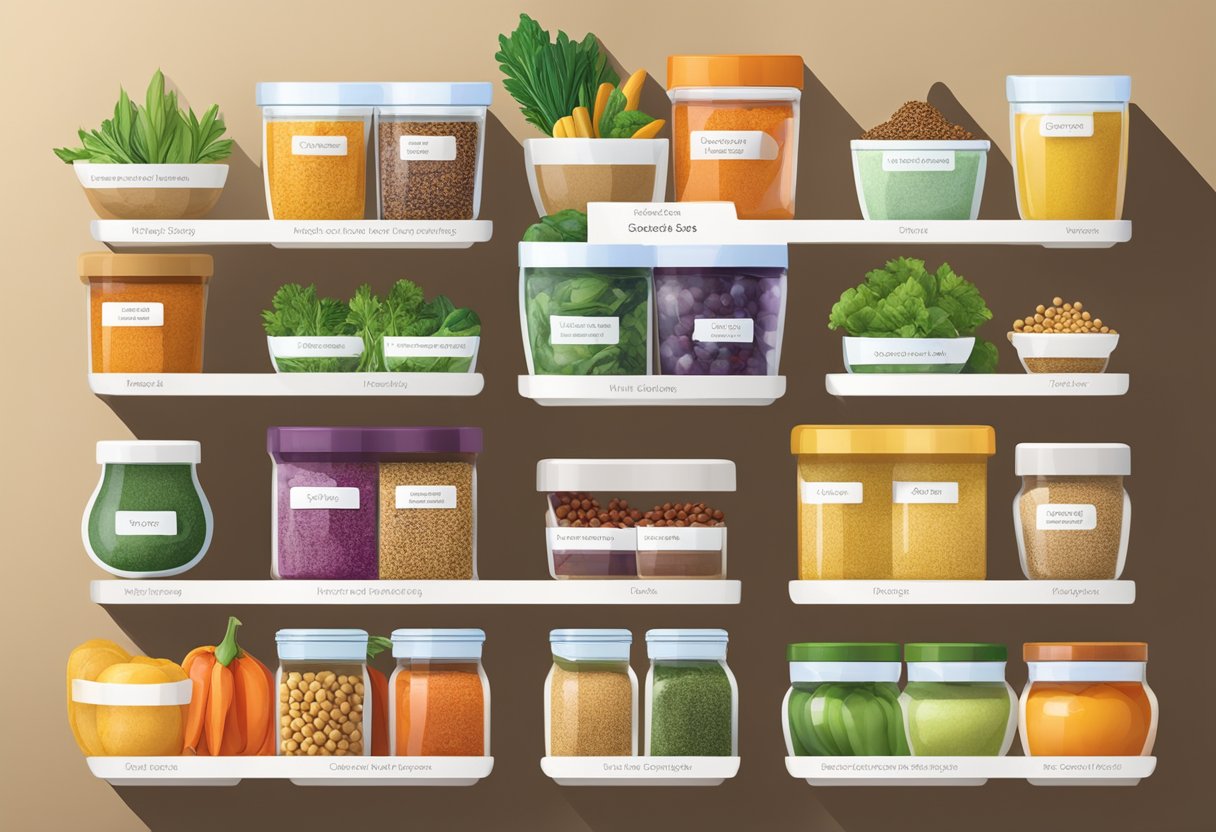
When following a gluten-free Mediterranean diet, understanding and managing macronutrients—proteins, carbohydrates, and fats—is vital for maintaining a healthy balance of calories and nutrients.
Understanding Fats: Saturated, Unsaturated, and Trans Fats
The gluten-free Mediterranean diet emphasizes the importance of healthy fats. Saturated fat intake should be limited as it is associated with higher cardiovascular risks. Instead, the focus is on unsaturated fats, found in foods such as olive oil and avocados, which support heart health. Trans fats, often found in processed foods, should be avoided completely due to their negative impact on cholesterol levels and heart health.
The Role of Carbohydrates in a Gluten-Free Diet
Carbohydrates are a crucial energy source but choosing the right type is key. On a gluten-free Mediterranean diet, one should prioritize fiber-rich whole grains like brown rice and quinoa, which are gluten-free and provide sustained energy. This contributes to a sense of fullness and can aid in weight management.
Protein Intake and Quality
Proteins are essential for muscle repair and growth. On this diet, emphasis is placed on high-quality proteins from fish, legumes, and lean poultry. They provide necessary amino acids without the high saturated fat content that’s often found in red meat. This not only matches the gluten-free requirements but also aligns with the moderate calorie approach of the Mediterranean diet.
Dietary Patterns and Eating Habits
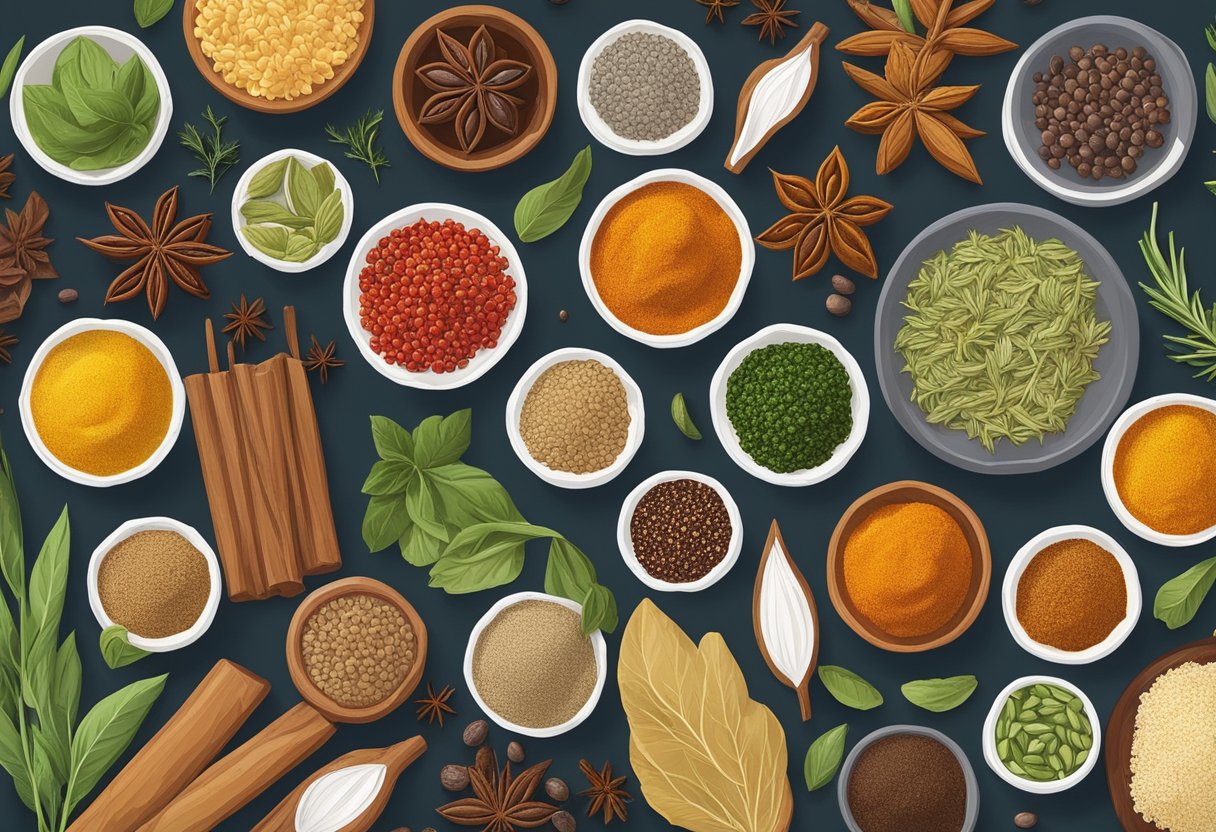
In adopting a gluten-free Mediterranean diet, individuals focus on plant-based foods and incorporate non-Mediterranean spices and herbs to enhance flavors without relying on gluten-containing elements. Each component, from meal planning to the timing of consumption, plays a critical role in the effectiveness of the diet.
Meal Planning and Preparation
Successful adherence to a gluten-free Mediterranean diet hinges on strategically planning meals. Individuals often include a variety of vegetables, fruits, whole grains that are gluten-free, legumes, nuts, seeds, and lean proteins, particularly from fish and poultry. They use spices and herbs like rosemary, thyme, and turmeric to add rich flavors without gluten. Meal prepping should emphasize fresh, seasonal produce and minimally processed foods to align with dietary guidelines.
Portion Control and Serving Sizes
Understanding and implementing appropriate serving sizes is vital. A typical approach may include:
- Half the plate filled with vegetables and fruits,
- A quarter with gluten-free grains such as quinoa or rice,
- A quarter with protein sources like fish or chicken.
Moderate amounts of healthy fats, primarily extra virgin olive oil, are used for cooking or dressing. Snacking on nuts, seeds, and fresh fruits between meals can support metabolism without deviating from dietary patterns.
Frequency and Timing of Meals
The frequency and timing of meals are key facets of eating habits within this diet. It usually involves consuming three main meals along with two smaller snacks throughout the day to maintain steady energy levels. Dinner is often lighter and consumed well before bedtime to promote digestion. Individuals may adjust their meal plans according to personal schedules, metabolic needs, and hunger cues, while still maintaining the core principles of the diet’s dietary patterns.
Health Outcomes Linked to Dietary Choices
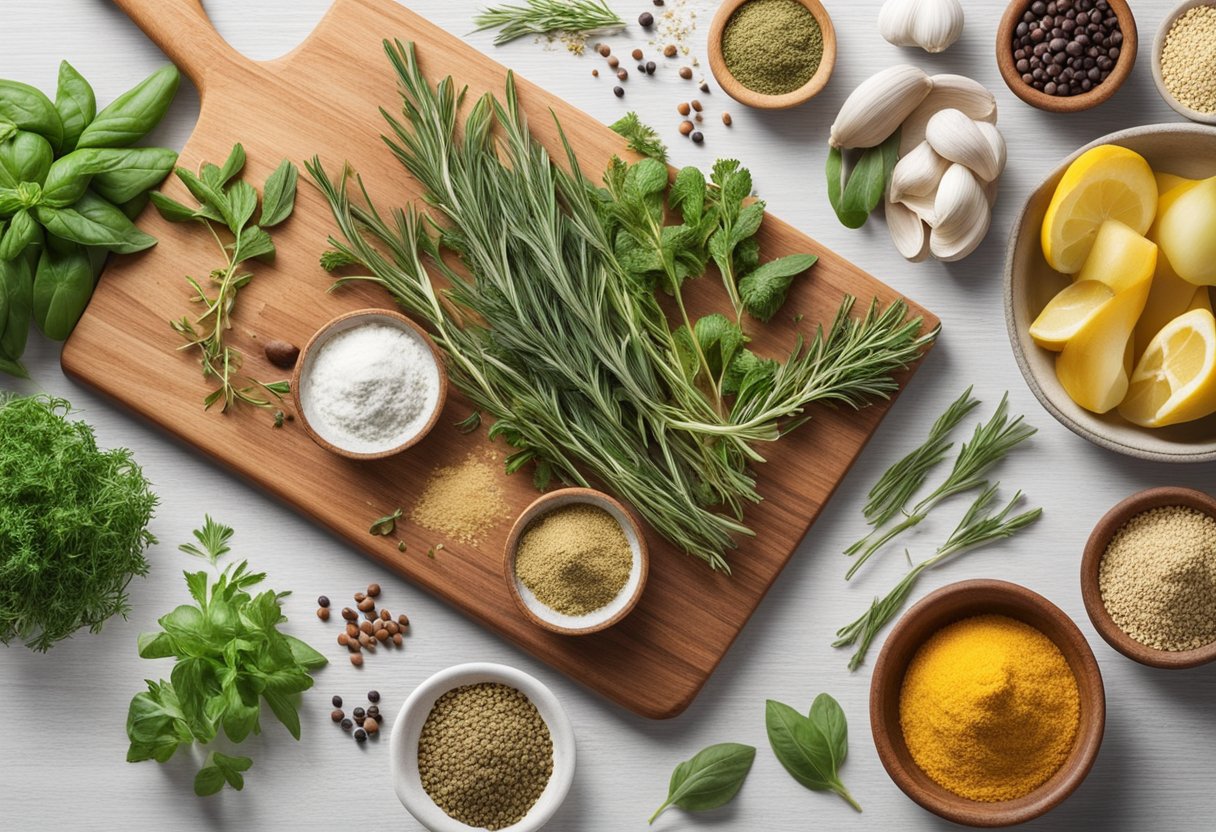
Adhering to a gluten-free Mediterranean diet, rich in herbs and spices typical of non-Mediterranean regions, can significantly influence health outcomes. This diet’s benefits extend from lipid and blood pressure regulation to weight management and chronic disease prevention.
The Impact on Cholesterol and Blood Pressure
The Mediterranean diet, enhanced with diverse herbs and spices, is known for its role in lipid management. Herbs like garlic have been shown to lower LDL cholesterol (the “bad” cholesterol) and overall cholesterol levels, while spices such as turmeric may help manage blood pressure. Studies suggest that high antioxidant content in such spices can promote arterial health, potentially decreasing the risk of hypertension and subsequent cardiovascular disease.
Mediterranean Diet and Weight Management
Incorporating various spices into a gluten-free Mediterranean diet has been associated with healthy body weight and reduced rates of obesity. This is partly due to the diet’s emphasis on high-fiber, nutrient-dense foods such as fruits, vegetables, and whole grains, which are naturally gluten-free and promote satiety. These dietary choices can also positively affect metabolic health, helping to manage or prevent type 2 diabetes.
Disease Prevention and Management
A gluten-free Mediterranean diet, abundant in unique spices, contributes to the prevention and management of chronic diseases. For instance, the anti-inflammatory properties of certain spices, coupled with the antioxidants found in the Mediterranean palette, may aid in reducing the risk of cancer, NAFLD (non-alcoholic fatty liver disease), and even improve cognitive function. Furthermore, this diet is often recommended for managing inflammation and stroke prevention, offering a holistic approach to healthcare through dietary choices.
Food Quality, Sourcing, and Sustainability
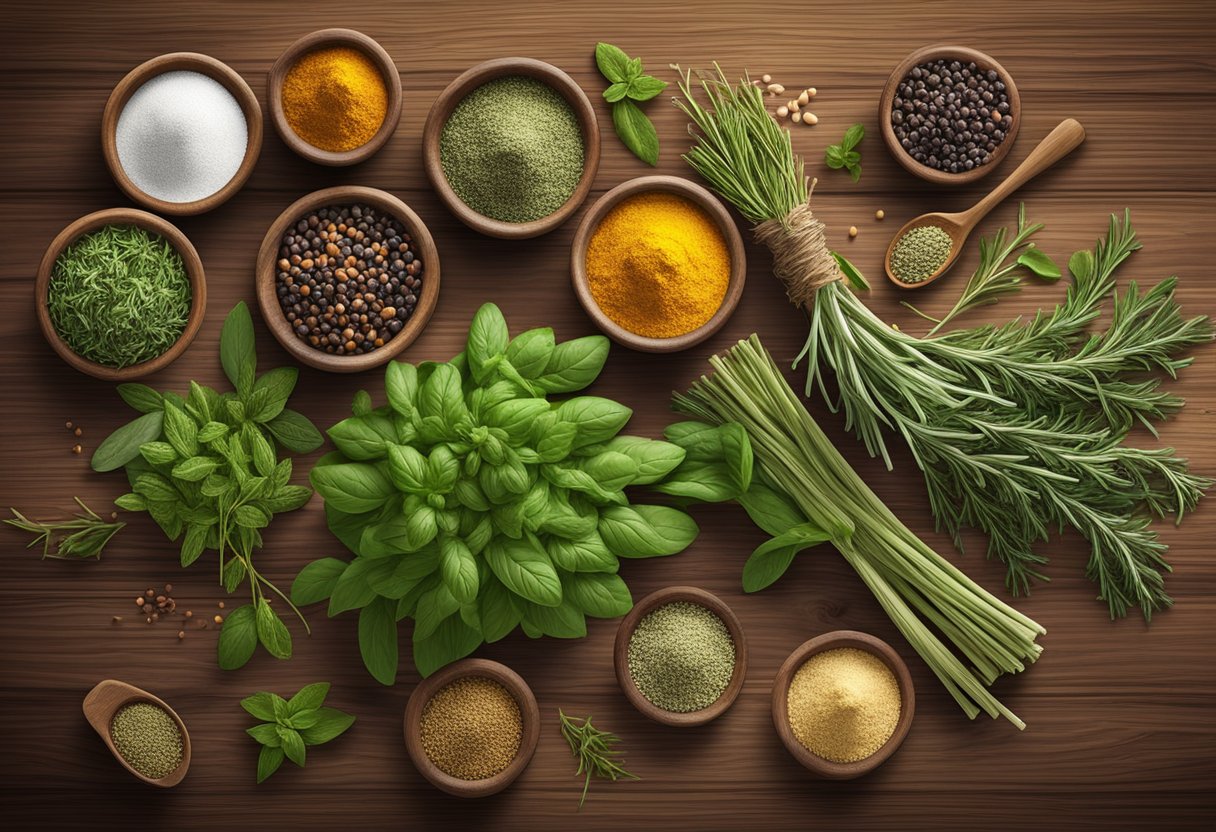
Incorporating non-Mediterranean spices and herbs into a gluten-free Mediterranean diet requires careful consideration of ingredient quality, local and seasonal sourcing, and sustainable practices. These factors play critical roles in enhancing the diet’s health benefits and minimizing the ecological footprint.
Choosing Quality Ingredients
For optimal health benefits and flavor, consumers should seek out high-quality ingredients like extra virgin olive oil, known for its purity and health-promoting properties. They must also ensure that non-Mediterranean spices and herbs are authentic, unadulterated, and, where applicable, certified gluten-free to avoid cross-contamination.
Local and Seasonal Food Principles
Embracing local foods means selecting ingredients produced close to home, which supports community suppliers and reduces transportation emissions. Prioritizing seasonal foods further aligns with sustainability goals, as it often results in lower energy use and supports biodiversity within agricultural systems.
Environmental Impact and Waste Reduction
A gluten-free Mediterranean diet, rich in a plant-based regimen, should also focus on minimizing environmental impact. Implementing waste reduction practices, such as composting and responsible packaging, can significantly improve one’s quality of life by fostering a health-promoting and sustainable living environment. This responsibility extends to both producers and consumers, as they both influence healthy life outcomes and the vitality of the planet.
Personalization and Lifestyle Considerations
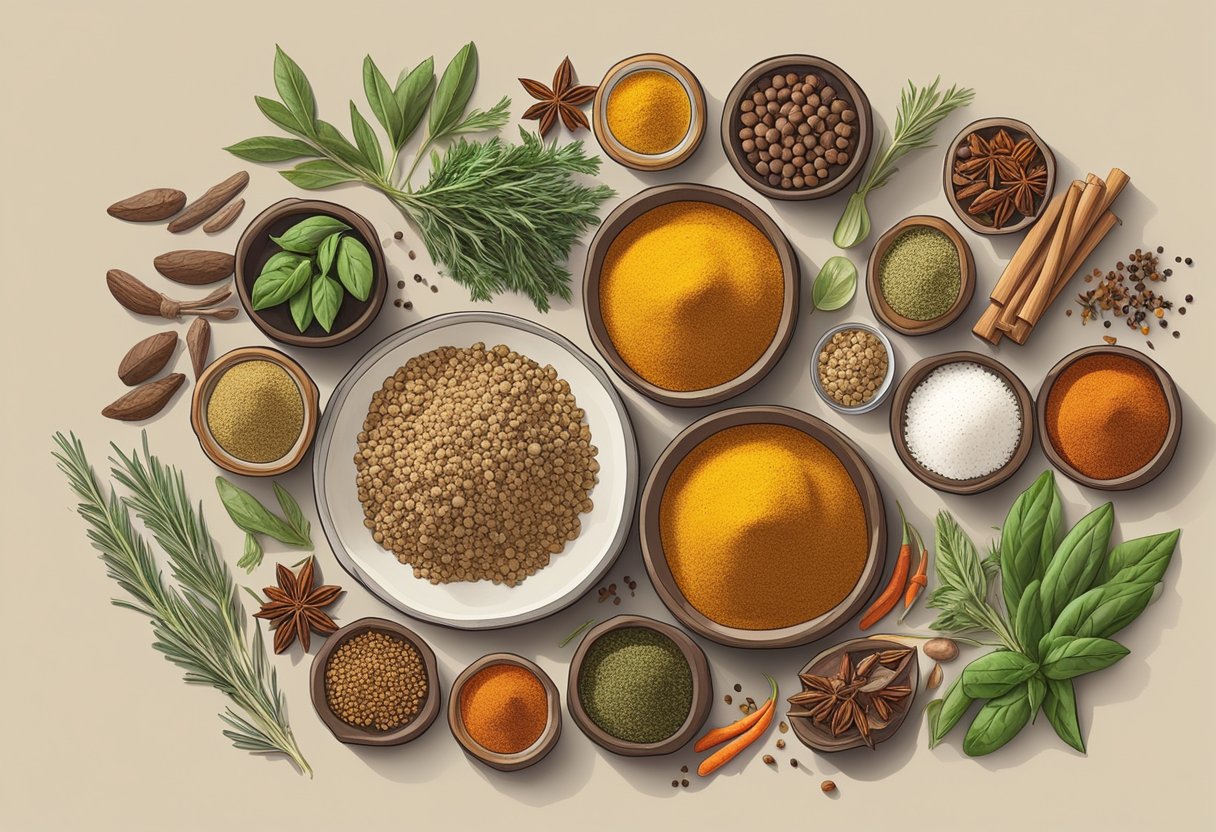
Adopting the gluten-free Mediterranean diet requires more than just understanding its principles—it necessitates tailoring the diet to one’s unique lifestyle and health needs while maintaining a balance between enjoyment and nutrition.
Adapting to Dietary Restrictions and Allergies
When individuals have dietary restrictions due to allergies or celiac disease, the gluten-free Mediterranean diet can be an accommodating choice. It naturally emphasizes foods like fruits, vegetables, and lean proteins that are less likely to trigger allergies. To ensure safety and health, individuals should consult with a dietitian to identify suitable non-Mediterranean spices and herbs that meet their nutritional needs without compromising their health. For example:
- Allergies to Legumes: Substitute lentils and chickpeas with quinoa or gluten-free grains.
- Nut Allergies: Use seeds, such as sunflower or pumpkin, for added texture and nutrition.
Integrating Physical Activity and Exercise
The benefits of the gluten-free Mediterranean diet extend beyond food choices, encompassing a holistic approach that includes physical activity. Incorporating regular exercise can improve one’s quality of life and support the health of the gut microbiota, crucial for individuals on this wellness journey. For example:
- Daily Walks: Enhance cardiovascular health and improve gut motility.
- Swimming: Low impact and supports joint health.
Balancing Personal Preferences with Nutritional Needs
Individuals embarking on this dietary path must consider their personal preferences to ensure long-term adherence and satisfaction. They should choose herbs and spices that not only comply with the gluten-free Mediterranean principles but also align with their taste preferences, enhancing their overall quality of life. For example:
- Herb Preferences: Incorporate rosemary or thyme instead of non-compliant seasonings.
- Flavor Profiles: Seek gluten-free alternatives that mimic favorite flavors, like tamari for soy sauce.
Here, food choices are guided not only by dietary needs but also by one’s enjoyment, facilitating a sustainable and pleasurable dietary pattern.
Social and Cultural Impacts on Diet
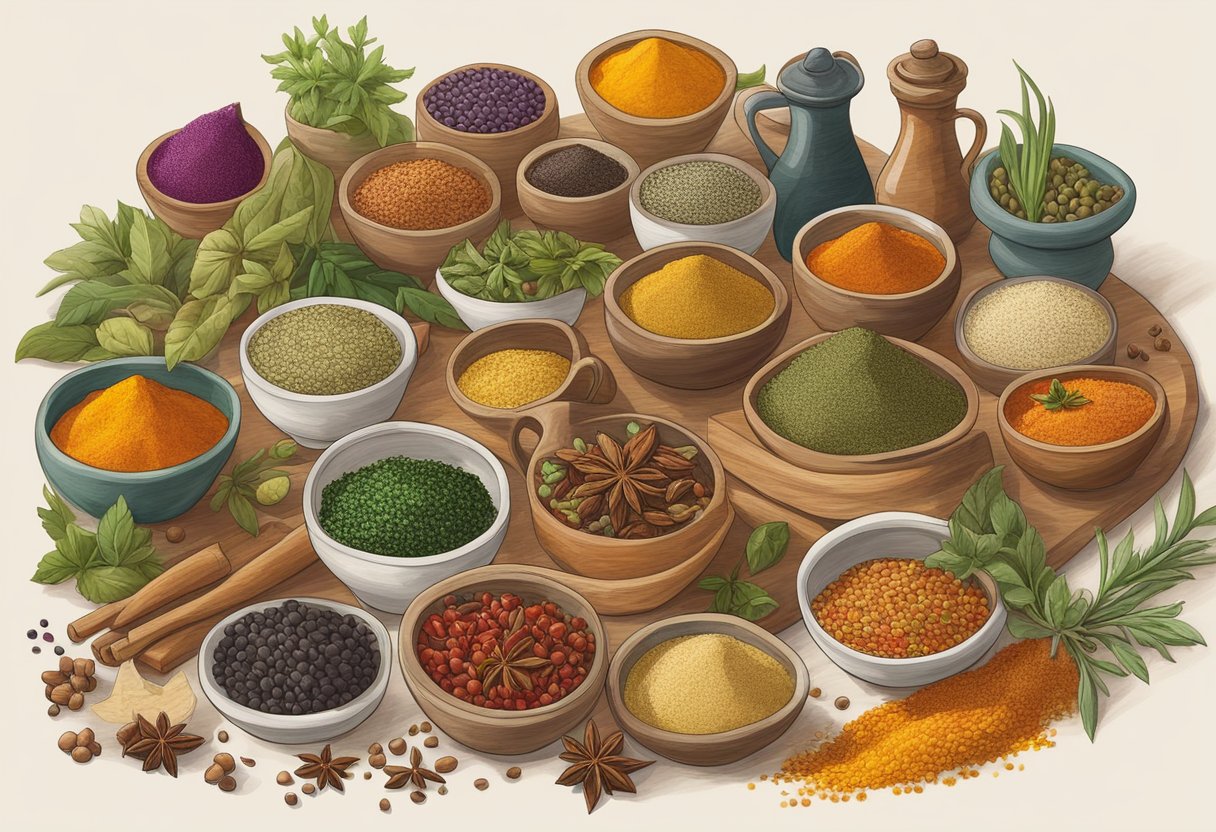
Dietary practices are often deeply intertwined with social and cultural frameworks, shaping and being shaped by the collective habits and beliefs of a community. Within the context of a gluten-free Mediterranean diet, these factors play a significant role.
The Role of Family and Community
In many societies, family units and community gatherings are central to food consumption and dietary habits. Meals are typically a collaborative effort, involving the selection, preparation, and enjoyment of food together. For individuals on a gluten-free Mediterranean diet, this collective environment can significantly influence the inclusion of non-Mediterranean spices and herbs. These ingredients may be incorporated as a nod to cultural diversity or out of necessity when traditional Mediterranean ingredients are unavailable or unsuitable due to gluten sensitivity.
Impact of Culture on Food Choices
Culture largely defines what is deemed acceptable and preferred in a diet. It dictates staple foods, preparation methods, and even meal timings. Although the Mediterranean diet is characterized by a reliance on fresh produce, whole grains, and healthy fats, adaptations are made when adopted outside the Mediterranean region to accommodate local tastes and available ingredients. When adapting this diet for gluten-free needs, there’s an increased importance on the selection of spices and herbs, as they become essential for flavoring and diversifying dishes without compromising dietary restrictions. For example, the use of turmeric and cumin in vegetable dishes or rosemary and thyme with poultry are culturally influenced choices that enhance the gluten-free Mediterranean culinary experience.
Frequently Asked Questions

Adapting to a gluten-free Mediterranean diet involves incorporating safe, non-traditional herbs and tweaking recipes to align with dietary needs, ensuring flavorful and healthful eating.
What alternatives to traditional Mediterranean herbs are suitable for a gluten-free diet?
When considering alternatives, individuals can explore gluten-free seasoning options such as salt, paprika, oregano, chili, onion powder, and garlic powder. Care should be taken with mixed seasonings to ensure they are labeled gluten-free.
How can I adapt common Mediterranean recipes to be gluten-free?
Adapting Mediterranean recipes typically entails substituting gluten-containing ingredients with gluten-free grains like quinoa, amaranth, or buckwheat, which should be clearly labeled as gluten-free.
Which oils are recommended for cooking within a gluten-free Mediterranean diet?
The gluten-free Mediterranean diet promotes the use of healthy fats. Oils such as extra virgin olive oil and avocado oil are excellent choices due to their health benefits and gluten-free status.
What are some gluten-free breakfast options that align with the Mediterranean diet?
A gluten-free Mediterranean breakfast may feature a cup of cooked gluten-free whole grains like quinoa, with mixed berries and nuts, paired with plain, low-fat Greek yogurt. These ingredients should be verified gluten-free to avoid cross-contamination.
Can gluten-free meal delivery services accommodate a Mediterranean diet plan?
Several meal delivery services offer options that cater to specific dietary needs, including the gluten-free Mediterranean diet. It is important to ensure that the service provides meals that strictly adhere to gluten-free guidelines.
What should I include in a gluten-free Mediterranean diet shopping list?
A shopping list should include whole grains that are verified gluten-free, fresh fruits and vegetables, legumes, nuts, seeds, herbs, spices, and healthy oils like olive oil. Fish and seafood, important elements of the diet, should be eaten twice a week, as highlighted in the pyramid guide for combining the Mediterranean and gluten-free diets.



